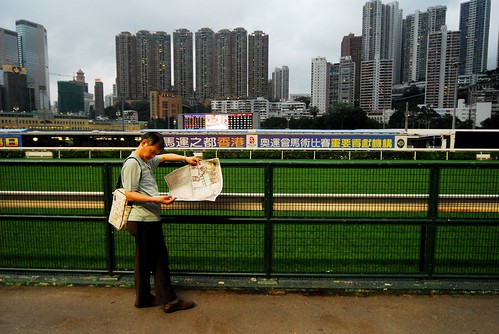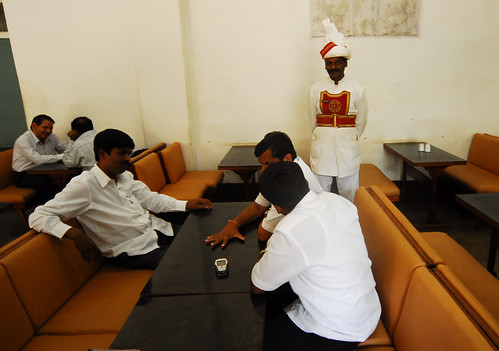A day at the Races in Hong Kong

Behind the high walls, in the temple courtyard, among clouds of incense, Hong Kong denizens kneel before the statue of the Chinese deity Wong Tai Sin and frown as they concentrate on the runners in the second race at Happy Valley. All around petitioners lay out elaborate lunches for the gods. An ancient woman on my left has arrived with an entire roast pig, its mouth stuffed with dates. Others have brought pomegranates, oranges adorned with sticks of incense, tins of Carlsberg, packets of Marlboros. The gods apparently are partial to a quiet cigarette.
They have come to plead for divine assistance, for some happy turn of fortune. Many are shaking cylinders of bamboo sticks until one drops out. The answer to their desires lies in the prophesy that corresponds to the number on the stick. I bow my head, think of horses, and rattle the sticks. No5 spills out. It is a race tip from above.
[1,2 -Punters at Happy Valley, Race Course in Hong Kong]


On race days, Hong Kong's pulse is marked by the crack of the starter's pistol. Over five million bets are laid on each meeting, and all over Hong Kong you can see anxious punters pause in their daily chores to turn up the radio. Racing's hold on this city can hardly be exaggerated.
In Canton in the old days it was said that Chinese housewives could hardly buy a cabbage without offering to shoot craps with the greengrocer, double or quits.
I look through the form sheets, and there it is. At 8:15, race three, horse 5, Macho Expresso. The jockey's colours are red with a yellow star.
An estimated 40,000 race-goers are filing into the grandstands and the boxes.
It glows beneath floodlights, as green and lush as an Irish furlong. Around the track stands an arena of skyscrapers. As night falls, a thousand windows glitter.

I hurry downstairs to find the runners stepping out among their well-groomed owners. Expresso is a leggy beauty. I try to catch her eye but she tiptoes past me, nose in the air. If the horses seem a trifle superior it is no wonder. They are all expats, flown in first-class, from Europe and Australia, and stabled in five-star facilities, with air-conditioning, swimming pools, piped music and imported oats. Some are said to live in high-rise stables with splendid views of the harbour and 24-hour room service.
Understanding the betting at Happy Valley would need a degree in higher mathematics. There are a host of exotic bets, things I had never heard of, such as the quinella, the double, the treble, the double trio, the triple trio, the six up, the all up, and other such combinations.
I decide to keep things simple. It will be Macho Expresso to win.
In front of me at the betting window is an elderly women in blue silk. I watch over her shoulder as she calmly places $HK25,000 ($3430) on Royal Attire to win. When she turns away from the window, clutching her betting ship, she glances up at me and smiles. She has the face of an angelic grandmother, the aura of wisdom. Her confident smile seems like an omen. What am I going on? Bamboo sticks? I must be insane.
"Royal Attire, in the 8pm," I instruct the teller.
I push the bills through the grill.
"One hundred and thirty-three dollars and forty-seven cents?" the teller asks. "The whole lot." I try to sound confident. "To win." My mouth feels dry. I hurry down to the rail. Away from the more cerebral boxes, the grandstand has the frisson of fortunes won and lost. The crowd is busy studying the racing papers. Most wear earphones, listening carefully to live radio broadcasts. Luck is the invisible presence that moves among them.

The bell sounds and suddenly the horses are off. A murmuring sound arises from the grandstands as thousands of punters quietly urge on their horses. Royal Attire seems to be somewhere in the middle of the pack as they thunder down the back straight. The man next to me is pounding his rolled-up newspaper on the rail. "Expresso," he chants. "Expresso."
The whole thing seems to be happening far too quickly. In the melee of horses I can't see Royal Attire anywhere. As they swing into the last straight the murmuring of the crowd rises to a crescendo. The horses are galloping towards us, the jockeys crouched in the saddle. They thunder past, a confused blur of horseflesh and raised whips. The winning numbers flash up on the screen. My neighbour seizes my hand and shakes me until I rattle. "Very good, very good ... Expresso, very good."

Royal Attire has run so far back in the field she could almost have been entered in the following race. I tear up my betting slip. There is a moral here but I am in no mood to work out what it is.

Behind the high walls, in the temple courtyard, among clouds of incense, Hong Kong denizens kneel before the statue of the Chinese deity Wong Tai Sin and frown as they concentrate on the runners in the second race at Happy Valley. All around petitioners lay out elaborate lunches for the gods. An ancient woman on my left has arrived with an entire roast pig, its mouth stuffed with dates. Others have brought pomegranates, oranges adorned with sticks of incense, tins of Carlsberg, packets of Marlboros. The gods apparently are partial to a quiet cigarette.
They have come to plead for divine assistance, for some happy turn of fortune. Many are shaking cylinders of bamboo sticks until one drops out. The answer to their desires lies in the prophesy that corresponds to the number on the stick. I bow my head, think of horses, and rattle the sticks. No5 spills out. It is a race tip from above.
[1,2 -Punters at Happy Valley, Race Course in Hong Kong]


On race days, Hong Kong's pulse is marked by the crack of the starter's pistol. Over five million bets are laid on each meeting, and all over Hong Kong you can see anxious punters pause in their daily chores to turn up the radio. Racing's hold on this city can hardly be exaggerated.
In Canton in the old days it was said that Chinese housewives could hardly buy a cabbage without offering to shoot craps with the greengrocer, double or quits.
I look through the form sheets, and there it is. At 8:15, race three, horse 5, Macho Expresso. The jockey's colours are red with a yellow star.
An estimated 40,000 race-goers are filing into the grandstands and the boxes.
It glows beneath floodlights, as green and lush as an Irish furlong. Around the track stands an arena of skyscrapers. As night falls, a thousand windows glitter.

I hurry downstairs to find the runners stepping out among their well-groomed owners. Expresso is a leggy beauty. I try to catch her eye but she tiptoes past me, nose in the air. If the horses seem a trifle superior it is no wonder. They are all expats, flown in first-class, from Europe and Australia, and stabled in five-star facilities, with air-conditioning, swimming pools, piped music and imported oats. Some are said to live in high-rise stables with splendid views of the harbour and 24-hour room service.
Understanding the betting at Happy Valley would need a degree in higher mathematics. There are a host of exotic bets, things I had never heard of, such as the quinella, the double, the treble, the double trio, the triple trio, the six up, the all up, and other such combinations.
I decide to keep things simple. It will be Macho Expresso to win.
In front of me at the betting window is an elderly women in blue silk. I watch over her shoulder as she calmly places $HK25,000 ($3430) on Royal Attire to win. When she turns away from the window, clutching her betting ship, she glances up at me and smiles. She has the face of an angelic grandmother, the aura of wisdom. Her confident smile seems like an omen. What am I going on? Bamboo sticks? I must be insane.
"Royal Attire, in the 8pm," I instruct the teller.
I push the bills through the grill.
"One hundred and thirty-three dollars and forty-seven cents?" the teller asks. "The whole lot." I try to sound confident. "To win." My mouth feels dry. I hurry down to the rail. Away from the more cerebral boxes, the grandstand has the frisson of fortunes won and lost. The crowd is busy studying the racing papers. Most wear earphones, listening carefully to live radio broadcasts. Luck is the invisible presence that moves among them.

The bell sounds and suddenly the horses are off. A murmuring sound arises from the grandstands as thousands of punters quietly urge on their horses. Royal Attire seems to be somewhere in the middle of the pack as they thunder down the back straight. The man next to me is pounding his rolled-up newspaper on the rail. "Expresso," he chants. "Expresso."
The whole thing seems to be happening far too quickly. In the melee of horses I can't see Royal Attire anywhere. As they swing into the last straight the murmuring of the crowd rises to a crescendo. The horses are galloping towards us, the jockeys crouched in the saddle. They thunder past, a confused blur of horseflesh and raised whips. The winning numbers flash up on the screen. My neighbour seizes my hand and shakes me until I rattle. "Very good, very good ... Expresso, very good."

Royal Attire has run so far back in the field she could almost have been entered in the following race. I tear up my betting slip. There is a moral here but I am in no mood to work out what it is.

